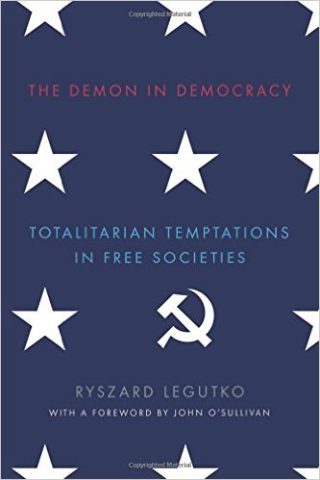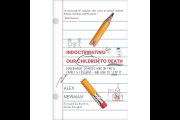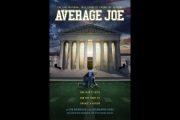
The Demon in Democracy — Totalitarian Temptations in Free Societies, by Ryszard Legutko, translated by Teresa Adelson, New York:
Encounter Books, 2016, 182 pages, hardcover.
The aftermath of last year’s presidential election in the United States has been marked by violent protests by individuals who are unwilling to accept the results of the constitutional election process. For the protestors, the election results have disrupted their belief in the irreversibility of that which they deem to be “Progress”; that is, the march toward a post-modern West, where socialism, collectivism, and political correctness rule without challenge. For many conservatives, the shock is seeing the widespread sentiment among so-called Millennials (and others) in favor of anything that attacks the foundations of our civilization, including the intellectual incoherence of trumpeting LGBTQ rights in the same breath that one advocates for unrestricted immigration by Muslims coming from countries that punish homosexuality with the death penalty.
Now, a new book by Polish author Ryszard Legutko sheds light on such phenomena. The Demon in Democracy —Totalitarian Temptations in Free Societies is written by a man who brings a wealth of practical experience and intellectual reflection to the examination of the troubles that haunt the West. Legutko is a professor of philosophy at Jagellonian University and has served in several high offices in the post-communist Polish government, as well as currently serving as a member of the European Parliament. His experiences under communist rule and during the decades that have followed have given him the opportunity to weigh the differences and similarities between communism and “liberal democracy.” As the author notes at the beginning of his book,
This book is about the similarities between communism and liberal democracy. The idea that such similarities exist started germinating timidly in my mind back in the Seventies of the last century, when for the first time I managed to get out of communist Poland to travel to the so-called West. To my unpleasant surprise, I discovered that many of my friends who consciously classified themselves as devoted supporters of liberal democracy — of a multiparty system, human rights, pluralism, and everything that every liberal democrat proudly listed as his acts of faith — displayed extraordinary meekness and empathy toward communism. I was unpleasantly surprised because it seemed to me that every liberal democrat’s natural and almost visceral response to communism should be that of forthright condemnation.
In this regard, one might think of the experiences of Aleksandr Solzhenitsyn and many other dissidents and defectors, which parallel those of Legutko, that gave rise to the term “anti-anti-communism” to describe liberal democrats. As those who lived through the 1970s and 1980s might well remember, the European and American political elite quickly rejected those who escaped from the Communist bloc if such dissidents had the “audacity” to argue that the failures and horrors which were commonplace under communism pointed to a fundamental problem with socialism and communism as a whole.
For Legutko, a significant contributor to the commonality of mindset between Communists and liberal democrats is a shared understanding of “historical process”:
Three common threads occurring in Marx’s works have their counterparts in the liberal and democratic tradition. There is a belief in the unilateralism of history, leading inevitably and triumphantly to the era of perpetual peace, or, in other terms, to the refinement of commerce and cooperation that humanity will reach due to the victory of freedom over tyranny. Another is the equivalent of deliberate human action, albeit not run by the party, but by active entrepreneurs and all types of freedom fighters, as well as the distinguished minority groups, elite and enlightened rulers who will prepare humanity — until now apathetic, enslaved, and ignorant — for the new reality. The third topic — mankind’s achieving maturity and intellectual independence — is usually described in simpler language than the German-Romantic used by the young Karl Marx and amounts to a promise of a modern society liberated from ignorance and superstition.
Like the Communist, the liberal democrat believes in “the inevitability of history,” meaning any and all means are justified to accomplish that “inevitable” future end. From such a perspective, as Legutko notes, “Both communism and liberal democracy are therefore perceived — from an inside perspective — as having no alternatives. The only change that one could imagine happening was one for the worse, which in the eyes of supporters meant not a slight deterioration, but a disaster.” Thus one can readily see the reason for the unhinged hysteria on the American Left: Any notion that a new president will not continue the march toward the triumph of democratic socialism is “not a slight deterioration, but a disaster.”
Legutko recognizes that the current liberal democratic mentality is a perversion of the earlier ideal — it is an abstraction no longer rooted in the earlier virtues of the Christian West. Thus, for example, Legutko declares:
The portrayal of liberal democracy as a realization of the eternal desire for freedom is very popular, almost verging on a platitude, especially in recent decades. This picture is false. First, liberalism was certainly not the only orientation expressing the desire for freedom, nor was it particularly consistent in this devotion. The supporters of republicanism, conservatism, romanticism, Christianity, and many other movements also demanded freedom, and did a lot to advance its cause. If freedom as we understand it in Western civilization is not only an abstract value, but has a concrete shape well-grounded in institutions, social practices, and mental habits, then the contribution of liberalism is one of many, far from decisive. It is hard to imagine freedom without classical philosophy and the heritage of antiquity, without Christianity and scholasticism, without different traditions in the philosophy of law and political and social practices, without ancient and modern republicanism, without strong anthropology and ethics of virtues and duties, without Anglo-Saxon and continental conservatism or many other components of the entire Western civilization.
Legutko recognizes that “by rejecting Christianity — after having marginalized the classical heritage — Europe, and indeed, the entire West not only slides into cultural aridity, a process noticeable for some time, but also falls under the smothering monopoly of one ideology whose uniformity is being cleverly concealed by the deafening rhetoric of diversity that has been pouring into people’s minds at all occasions and contexts.” Christianity, he declares, “is the last great force that offers a viable alternative to the tediousness of liberal-democratic anthropology.” As the idolatry of liberal democracy proves itself to be as much an act of vanity as all other forms of idolatry, the Christian verity remains to offer the same hope and promise that it has proclaimed across the ages, precisely because it recognizes the fundamental limitations of human beings. As Legutko concludes:
Whether the future of human history will add some new chapters, we cannot say, but such a scenario seems — upon the authority of common sense — likely. But the issue is not that new impulses, fashions, mood swings, major events, and other unpredictable factors will always emerge to affect the course of history and people’s perception of it. The real change will come only when the current view of man spends itself and is considered inadequate. Only then will other stories develop or be revived — the former as a result of new experiences, the latter as a result of reactivating the long-dormant areas of collective memory — allowing a different look at human fate and the dream through which individuals and communities express their aspirations.…
Perhaps the long story reaching denouement in its last chapter that modernity divulged to us is not just one of many stories that can be replaced by another, but a basic truth about modern man who, after many adventures, downfalls and ascents, exultations and tribulations, after following many chimeras and surrendering to many temptations, finally arrived at the accurate recognition of who he is. If this indeed were the case, then further fundamental changes in human history would no longer be possible, except for the worse. Such an eventuality would be, for some, a comforting testimony that man finally learned how to live in a sustainable harmony with his nature. For others it will be a final confirmation that his mediocrity is inveterate.
The Demon in Democracy is worthy of thoughtful consideration by all those who wonder at the cause of the current troubles of the West, and seek the way back to civilizational sanity.



